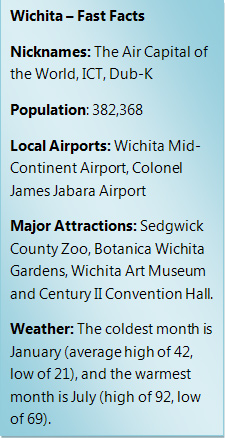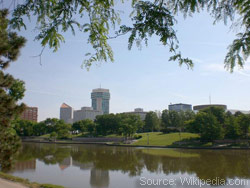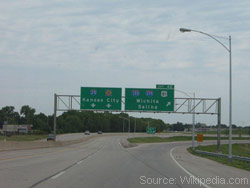 Wichita is one of the most prosperous cities in the state of Kansas and boasts of a rich history which includes oil industries and aircraft manufacturing plants. Enhanced by public art and sculptures, the city has evolved into one of the most happening places in the Midwest with plenty of opportunities to offer. In 2006 Wichita was ranked 9th among the list of 10 Best Places to Live in the U.S. according to CNN Money magazine.
Wichita is one of the most prosperous cities in the state of Kansas and boasts of a rich history which includes oil industries and aircraft manufacturing plants. Enhanced by public art and sculptures, the city has evolved into one of the most happening places in the Midwest with plenty of opportunities to offer. In 2006 Wichita was ranked 9th among the list of 10 Best Places to Live in the U.S. according to CNN Money magazine.
Wichita's tourist attractions are geared for wholesome family fun. Whether it is experiencing culture through the performances of the Wichita Grand Opera and Wichita Symphony, exploring the tiger trek at the Sedgwick County Zoo, reliving history through museums, shopping or embracing nature at Botanica -the Wichita Gardens -in Wichita you never get bored.
This guide will provide you with some helpful tips and information on just about everything you need to know if you're going to be making the move to Wichita. From the city's neighborhoods and school systems to the employment options and recreational activities available within the city, you'll find it all in this guide so that you can go into your move with the knowledge that is needed to make sure everything goes as smoothly as possible.
Wichita Climate
Geographically, Wichita is located in the Great Plains and lacks any moderating influences like mountains and large water bodies. This makes the city susceptible to extreme weather conditions like hail, lightning, thunderstorms, and tornadoes.
The climate is characterized as a humid subtropical with humid summers and cold winters. From temperatures as low as 10oF in the month of January to 114oF during the month of July, Wichita experiences a wide range of temperatures. The maximum precipitation is experienced during the month of June.
Wichita Geography and Neighborhoods
Downtown is the city's business district and it is evolving into a 24/7 experience. Short commutes and cultural convenience are some of the reasons why young professionals, families, and empty-nesters are seeking a home in the business district. Along the Arkansas River is the Riverside neighborhood with houses that vary from bungalows to Victorian homes. Riverside is surrounded by several parks.
Eastborough and College Hill reflect an old-world charm with brick roads and classic homes that were built in the 1900s. Waterfront and Bradley Fair are witnessing rapid growth where you can find tastefully done houses and elegant estates and shopping areas. Brick-lined streets and old converted warehouses from the 1800s characterize Old Town with night clubs, restaurants, shops, movie theaters, condominiums, and apartments. Old Town is getting popular with the young crowds due to its proximity to Downtown.
Living Costs in the City
 The city's overall cost of living is nine percent lower than the national urban area average. Sales tax in Wichita is 7.3 percent. The overall cost of living in Wichita is low when compared to other places. The costs of clothing, alcohol, personal care, transport, grocery, and furniture are low while costs incurred on education and healthcare are high. Housing costs are a bargain in this city. Whether it is a previously owned single family home or a newly-built home, the prices of houses in Wichita are quite reasonable. Rents for apartments are 25 percent lower than the national figures.
The city's overall cost of living is nine percent lower than the national urban area average. Sales tax in Wichita is 7.3 percent. The overall cost of living in Wichita is low when compared to other places. The costs of clothing, alcohol, personal care, transport, grocery, and furniture are low while costs incurred on education and healthcare are high. Housing costs are a bargain in this city. Whether it is a previously owned single family home or a newly-built home, the prices of houses in Wichita are quite reasonable. Rents for apartments are 25 percent lower than the national figures.
The median family income in Wichita is $59,433, higher than the national average. The median home price for an average home in Wichita is $110,406, which is well below the national average for median home prices. However, this figure is on par with other real estate markets in surrounding areas.
Registering Your Car
Upon your arrival in Kansas after moving to the state permanently, you have a total of 90 days to update your registration and have your vehicle registered in the state before you may be required to pay a penalty.
A Kansas Driver's License can be obtained at any Kansas DMV location. The state requires new Kansas residents to update their license from their previous state to a Kansas driver's license as soon as possible after establishing permanent residency in the state. A driving test does not have to be taken if you have a currently valid out of state license, but supplemental driving courses are available.
Wichita Moving Resources
Moving and storage companies are ready and willing to help you with your move to Wichita, whether you're moving from out of state or from another county in Kansas. Make sure you get estimates from multiple moving services before you commit to hiring any (at least three estimates). Check back to our guides for tips on how to choose your moving service wisely with important questions to ask, differentiating between types of estimates, and mistakes to avoid. Visit the following pages at Movers.com to get quotes for the following services:
Wichita Schools
The Wichita Public School District 259 is the biggest school district in the entire state of Kansas. Over 50,000 students are enrolled in 90 schools throughout the city, including 10 high schools, 16 middle schools, 61 elementary schools and more than a dozen other special schools and programs. In addition to the public schools located in Wichita, there are three universities with campuses located in the city. They are Wichita State University, which is a four-year public university, and Friends University and Newman University, which are both private universities. The Wichita Area Technical College works with the National Institute for Aviation Research to produce skilled labor for working in the local aircraft manufacturing centers.
Wichita Employment
Some of the principal financial sectors in Wichita are manufacturing, healthcare and education. Manufacturing provided 21.6 percent of the total employment in 2003. Healthcare employs almost 28,000 people throughout the city.
With a relatively low unemployment rate of 6.6 percent and a job growth rate that's a staggering 34.33 percent, the job market is on the rise in Wichita and the local economy is in a period of great growth. The Federal Aviation Administration also operates an Air Route Traffic Control Center in Wichita.
Public Transportation
The bus system operated by Wichita Transit is the main public transportation option. The system is convenient, easy to use, and inexpensive. It maintains a fleet of American Disabilities Act-compliant buses and wheelchair-lift vans. Along with fixed route bus lines and demand-response paratransit routes, the Q-Line shuttle service through downtown is also being operated. Discounted passes along with unlimited ride passes are available at the Downtown Transit Center.
There are two major public airports located in the city of Wichita. The Wichita Mid-Continent Airport is the primary commercial airport in the city and it provides passengers with daily flights on 10 commercial airlines to several domestic hubs. It is also the largest airport in the state of Kansas. The Colonel James Jabara Airport is a much smaller general aviation facility which is located on the northeast side of the city.
Culture and Contemporary Life
 Home to several historical museums and performing arts groups, the cultural scene in Wichita is wide and varied. The Wichita Art Museum houses over 7,000 works of art and is the largest museum in the state. Other museums include the Wichita-Sedgwick County Historical Museum, Museum of World Treasures, and Great Plains Transportation Museum. The Century II Convention Hall in Downtown is the venue for performances by the Wichita Grand Opera, Wichita Symphony Orchestra, and Music Theatre of Wichita.
Home to several historical museums and performing arts groups, the cultural scene in Wichita is wide and varied. The Wichita Art Museum houses over 7,000 works of art and is the largest museum in the state. Other museums include the Wichita-Sedgwick County Historical Museum, Museum of World Treasures, and Great Plains Transportation Museum. The Century II Convention Hall in Downtown is the venue for performances by the Wichita Grand Opera, Wichita Symphony Orchestra, and Music Theatre of Wichita.
The Tallgrass Film Festival in October features films from all across the world. In the 1920s, Wichita was the seat of the aviation industry with over 80 companies involved in building planes and plane accessories. This has earned it the unique moniker “Aviation Capital of the World.” Wichita Black Arts Festival is a cultural celebration about rich artistic heritage of African American culture. From German to Mexican to Italian to Asian, the cuisine in Wichita is an eclectic mix of different cultures.
Moving to Wichita
Wichita is the biggest city in the state of Kansas and the most happening with numerous universities, nightclubs, restaurants, shopping centers, museums, and parks. The city offers loads of employment opportunities in various sectors such as manufacturing, education, health, transportation, business, and other services. Relocation to Wichita is no different than relocating to any part of the country - it requires an organized way of doing things. Planning the entire process to the last detail helps. The key to having a hassle-free move is employing licensed moving companies.